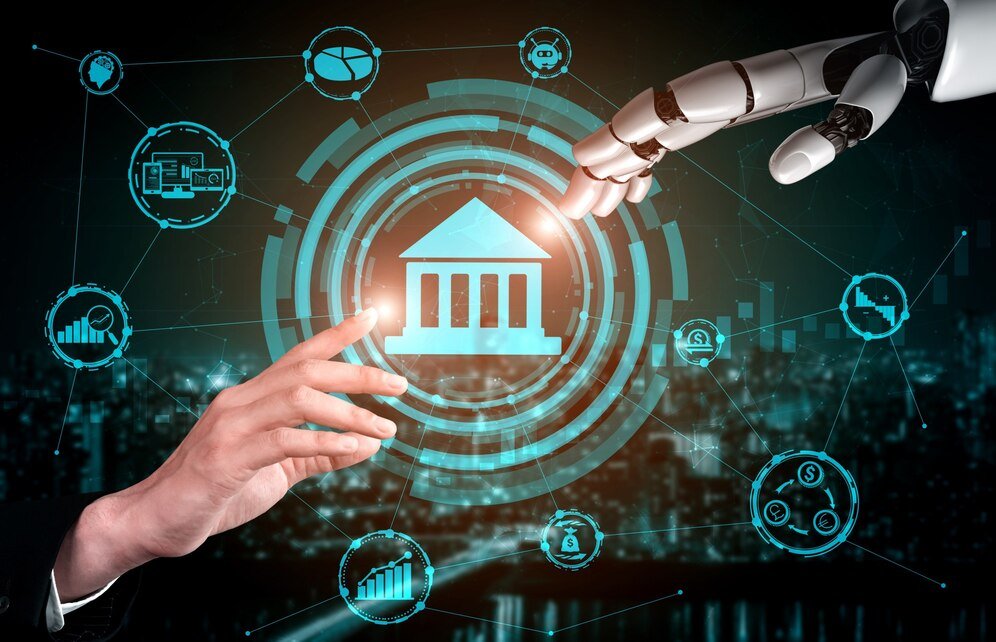In 2025, Man-made cognizance (man-made knowledge) is set to be a historic power in the fintech business, disturbing how money related organizations are conveyed, working on unique cycles, and reshaping how associations and purchasers attract with cash. The mix of PC based knowledge in fintech has proactively started to deal with various pieces of the financial scene.
However, by 2025, we can anticipate that these advances should arrive at new degrees of refinement, empowering more keen, productive, and customized monetary administrations. Computer based intelligence’s effect on dynamic cycles, from venture procedures to credit scoring and extortion location, will be significant, making monetary administrations more open, exact, and receptive to the necessities of people and organizations the same.
AI in Fintech Revolutionizing Financial Services
Man-made cognizance (PC based knowledge) is expecting a certainly critical part in the fintech business, changing money related organizations by additional creating adequacy, redesigning client experiences, and engaging more adroit route. Man-made reasoning headways, for instance, artificial intelligence, ordinary language taking care of, and data assessment.
AI in fintech organizations to break down huge measures of information continuously, uncovering experiences that were beforehand difficult to recognize. Simulated intelligence is utilized in an assortment of fintech applications, including misrepresentation recognition, credit scoring, customized monetary guidance, and algorithmic exchanging. By examining exchange examples and client conduct, artificial intelligence can recognize dubious exercises and expected misrepresentation, alarming organizations and clients before huge misfortunes happen.
Financial AI Transforming the Financial Landscape
Financial AI based intelligence is altering how monetary administrations are conveyed, empowering organizations to smooth out activities, decrease dangers, and proposition more customized administrations to clients. By outfitting the force of AI, regular language handling, and enormous information investigation, monetary man-made intelligence is improving dynamic cycles across different regions, including risk the executives, extortion discovery, client support, and venture techniques. Computer based intelligence calculations can dissect huge datasets continuously, distinguishing patterns and examples that human examiners could miss, which is especially valuable in regions like credit scoring and advance endorsements.
Intelligent Financial Tools Enhancing Financial Management
Clever monetary devices are reshaping how people and organizations deal with their funds by utilizing trend setting innovations like computerized reasoning, AI, and huge information investigation. These apparatuses give clients customized experiences, robotize routine errands, and improve dynamic cycles. For people, smart planning applications and monetary organizers assist with following spending, make investment funds objectives, and present constant suggestions for working on monetary wellbeing.
On the business side, wise monetary apparatuses empower mechanized invoicing, income investigation, and prescient estimating, making monetary activities more effective and precise. Man-made intelligence driven venture stages additionally help clients in building expanded portfolios, changing speculations in view of market patterns, and offering customized venture methodologies lined up with their monetary objectives.
The Rise of AI in Fintech
The joining of simulated intelligence in fintech has been a continuous pattern for quite a long time, with progressions in AI, regular language handling (NLP), and enormous information examination driving the development of the area. Fintech organizations and customary monetary establishments are utilizing simulated intelligence to dissect immense measures of information, mechanize cycles, and deal more customized encounters to their clients. By 2025, simulated intelligence is supposed to assume a significantly larger part in improving monetary direction, changing everything from how advances are endorsed to how financial backers deal with their portfolios.
At its center, simulated intelligence in fintech includes the utilization of calculations and information models that can examine enormous datasets rapidly and precisely. These frameworks are equipped for gaining from information examples and making expectations in light of that data. This ability has significant ramifications for navigation, particularly in regions where human judgment has customarily been slow or inclined to blunder. Artificial intelligence models can handle information continuously, distinguish patterns, and proposition noteworthy bits of knowledge, prompting quicker and more educated choices.

AI and Investment Strategies Smarter Decisions
One of the main effects of artificial intelligence on fintech is its capacity to improve speculation systems. Computer based intelligence driven stages are progressively being utilized to oversee speculation portfolios, improve resource allotment, and even foresee market developments. By 2025, artificial intelligence is supposed to assume a much bigger part in abundance the executives and retail effective money management, giving both individual financial backers and institutional clients with more brilliant, information driven bits of knowledge.
Artificial intelligence frameworks can break down immense amounts of market information, including verifiable patterns, news, financial pointers, and web-based entertainment feeling, to make forecasts about market developments and distinguish speculation open doors. AI calculations can ceaselessly gain from new information, refining their expectations over the long run and working on their exactness. For financial backers, this implies more exact proposals and streamlined portfolios custom fitted to their monetary objectives, risk resilience, and time skyline.
AI in Credit Scoring and Risk Management
Credit scoring is another region where artificial intelligence is altering direction. Generally, FICO ratings depended on a restricted arrangement of variables, like installment history, remarkable obligation, and credit requests. Notwithstanding, these conventional models have constraints, especially with regards to evaluating the financial soundness of people with restricted record, for example, more youthful customers or those from underbanked districts.
Artificial intelligence is assisting with resolving this issue by extending the scope of elements considered in credit scoring. AI calculations can investigate a more extensive exhibit of information, including virtual entertainment movement, exchange history, and, surprisingly, psychometric information, to precisely survey a singular’s financial soundness more. By 2025, we can expect computer based intelligence controlled credit scoring models to turn out to be more normal, empowering moneylenders to go with more educated and fair loaning choices.
AI-Powered Customer Service and Personalization
Computer based intelligence’s effect on fintech stretches out past venture procedures and credit scoring. One of the vital advantages of computer based intelligence is its capacity to upgrade client support and make customized encounters. In 2025, monetary organizations will progressively depend on simulated intelligence to draw in with clients in additional significant ways, conveying custom fitted administrations that address individual issues.
Chatbots and remote helpers, fueled by artificial intelligence and regular language handling (NLP), are now being utilized by banks and fintech organizations to give all day, every day client care. These computer based intelligence driven frameworks can deal with an extensive variety of client questions, from balance requests to exchange history, and, surprisingly, offer customized monetary counsel. By 2025, these frameworks will turn out to be significantly more modern, ready to figure out complex inquiries and give more precise, setting mindful reactions.

Ethical Considerations and Challenges
While the likely advantages of computer based intelligence in fintech are critical, there are additionally moral contemplations and provokes that should be tended to. One of the primary worries is the potential for predisposition in simulated intelligence calculations. Since AI models depend on authentic information to make expectations, they might acquire predispositions present in that information, which could prompt unjustifiable results, especially in regions like credit scoring and loaning. Monetary establishments should guarantee that computer based intelligence models are routinely evaluated and tried to limit predisposition and guarantee reasonableness.
Protection is another main pressing issue with regards to simulated intelligence in fintech. Computer based intelligence frameworks depend on tremendous measures of individual and monetary information, and there is a gamble that this information could be abused or gotten to by unapproved parties. Guaranteeing powerful information security measures, for example, encryption and secure information stockpiling, will be basic in keeping up with client trust and consenting to administrative necessities.
Man-made intelligence’s Job in Improving Monetary Straightforwardness
One of the critical advantages of artificial intelligence in fintech is its capacity to improve straightforwardness in monetary navigation. Conventional monetary administrations frequently depend on dark cycles that can be hard for buyers to comprehend, leaving them with little understanding into how choices are made, particularly in regions like advance endorsement, credit scoring, or speculation methodologies. Computer based intelligence, nonetheless, is changing this dynamic by giving more information driven and straightforward navigation.
For example, man-made intelligence models can make sense of how they showed up at a specific monetary proposal, for example, the elements considered in credit scoring or the reasoning behind venture ideas. This expanded straightforwardness can engage customers, empowering them to pursue better-educated monetary decisions and cultivating trust among them and monetary establishments.
Man-made intelligence in Misrepresentation Avoidance and Network protection
Man-made intelligence is likewise assuming a vital part in improving extortion counteraction and network safety inside the fintech area. With the ascent of advanced monetary administrations, digital dangers have become more modern, jeopardizing the two customers and monetary establishments. Artificial intelligence calculations can examine exchange designs continuously, distinguishing uncommon way of behaving or abnormalities that might show deceitful action. These artificial intelligence driven frameworks are fit for hailing dubious exchanges before they are finished, giving an extra layer of security for the two clients and monetary foundations.
Besides, AI models can constantly further develop their extortion identification abilities by gaining new information and adjusting to arising dangers. Notwithstanding misrepresentation identification, artificial intelligence is being incorporated into network safety frameworks to safeguard delicate monetary information from cyberattacks.
Conclusion
By 2025, simulated intelligence will have immovably laid down a good foundation for itself as a foundation of the fintech business, reshaping how monetary administrations are conveyed and upgrading dynamic across a scope of utilizations. From speculation systems and credit scoring to misrepresentation discovery and client assistance, simulated intelligence is further developing productivity, personalization, and exactness, empowering the two people and organizations to settle on more astute monetary choices.
Notwithstanding, as the utilization of artificial intelligence in fintech develops, it is fundamental for monetary foundations to address moral worries, like algorithmic predisposition and information protection, to guarantee that man-made intelligence driven monetary administrations stay fair, straightforward, and secure. With the right defends set up, simulated intelligence can possibly open new open doors in monetary administrations, making them more comprehensive, available, and proficient for everybody.


